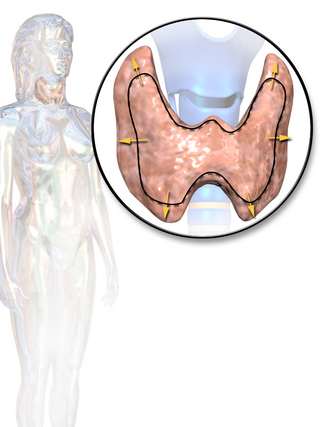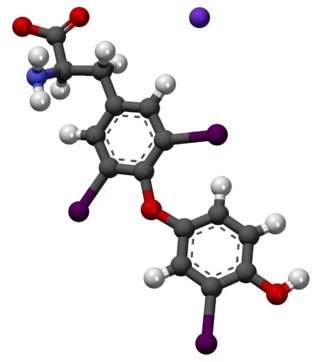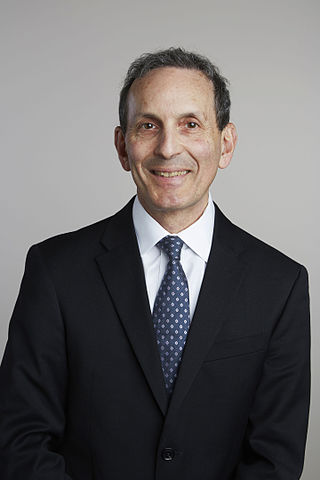Related Research Articles

Endocrinology is a branch of biology and medicine dealing with the endocrine system, its diseases, and its specific secretions known as hormones. It is also concerned with the integration of developmental events proliferation, growth, and differentiation, and the psychological or behavioral activities of metabolism, growth and development, tissue function, sleep, digestion, respiration, excretion, mood, stress, lactation, movement, reproduction, and sensory perception caused by hormones. Specializations include behavioral endocrinology and comparative endocrinology.

The thyroid, or thyroid gland, is an endocrine gland in vertebrates. In humans it is in the neck and consists of two connected lobes. The lower two thirds of the lobes are connected by a thin band of tissue called the thyroid isthmus. The thyroid is located at the front of the neck, below the Adam's apple. Microscopically, the functional unit of the thyroid gland is the spherical thyroid follicle, lined with follicular cells (thyrocytes), and occasional parafollicular cells that surround a lumen containing colloid. The thyroid gland secretes three hormones: the two thyroid hormones – triiodothyronine (T3) and thyroxine (T4) – and a peptide hormone, calcitonin. The thyroid hormones influence the metabolic rate and protein synthesis, and in children, growth and development. Calcitonin plays a role in calcium homeostasis. Secretion of the two thyroid hormones is regulated by thyroid-stimulating hormone (TSH), which is secreted from the anterior pituitary gland. TSH is regulated by thyrotropin-releasing hormone (TRH), which is produced by the hypothalamus.
Thyroid-stimulating hormone (also known as thyrotropin, thyrotropic hormone, or abbreviated TSH) is a pituitary hormone that stimulates the thyroid gland to produce thyroxine (T4), and then triiodothyronine (T3) which stimulates the metabolism of almost every tissue in the body. It is a glycoprotein hormone produced by thyrotrope cells in the anterior pituitary gland, which regulates the endocrine function of the thyroid.

Triiodothyronine, also known as T3, is a thyroid hormone. It affects almost every physiological process in the body, including growth and development, metabolism, body temperature, and heart rate.
The year 1952 in science and technology involved some significant events, listed below.
Iodine deficiency is a lack of the trace element iodine, an essential nutrient in the diet. It may result in metabolic problems such as goiter, sometimes as an endemic goiter as well as congenital iodine deficiency syndrome due to untreated congenital hypothyroidism, which results in developmental delays and other health problems. Iodine deficiency is an important global health issue, especially for fertile and pregnant women. It is also a preventable cause of intellectual disability.

Thyroid disease is a medical condition that affects the function of the thyroid gland. The thyroid gland is located at the front of the neck and produces thyroid hormones that travel through the blood to help regulate many other organs, meaning that it is an endocrine organ. These hormones normally act in the body to regulate energy use, infant development, and childhood development.

Liothyronine is a manufactured form of the thyroid hormone triiodothyronine (T3). It is most commonly used to treat hypothyroidism and myxedema coma. It can be taken by mouth or by injection into a vein.
Thyroid function tests (TFTs) is a collective term for blood tests used to check the function of the thyroid. TFTs may be requested if a patient is thought to suffer from hyperthyroidism or hypothyroidism, or to monitor the effectiveness of either thyroid-suppression or hormone replacement therapy. It is also requested routinely in conditions linked to thyroid disease, such as atrial fibrillation and anxiety disorder.
Desiccated thyroid, also known as thyroid extract, is thyroid gland that has been dried and powdered for medical use. It is used to treat hypothyroidism. It is less preferred than levothyroxine. It is taken by mouth. Maximal effects may take up to three weeks to occur.
Pitt-Rivers is an English surname adopted by later holders of the peerage Baron Rivers. Holders of the surname include:

Thyroid hormones are any hormones produced and released by the thyroid gland, namely triiodothyronine (T3) and thyroxine (T4). They are tyrosine-based hormones that are primarily responsible for regulation of metabolism. T3 and T4 are partially composed of iodine. A deficiency of iodine leads to decreased production of T3 and T4, enlarges the thyroid tissue and will cause the disease known as simple goitre.

Dr. Hossein Gharib is a physician who specializes in thyroid disorders. He was born in Tehran, Iran, on February 2, 1940, and is a consulting physician at the Mayo Clinic in Rochester, Minnesota.
Rosalind Venetia Lane Fox Pitt-Rivers FRS (née Henley; 4 March 1907 – 14 January 1990) was a British biochemist. She became the second president of the European Thyroid Association in 1971; she succeeded Jean Roche and was followed by Jack Gross in this position, all three names inextricably linked with the discovery of the thyroid hormone triiodothyronine (T3).

Daniel Joshua Drucker is a Canadian endocrinologist. A Fellow of the Royal Society, he is a professor of medicine at the Lunenfeld-Tanenbaum Research Institute, Mount Sinai Hospital, Toronto. He is known for his research into intestinal hormones and their use in the treatment of diabetes and other metabolic diseases.

Evelyn M. Anderson was an American physiologist and biochemist, most known for her co-discovery of adrenocorticotropic hormone in 1934.
Kenneth J. Sterling was a medical doctor and prominent researcher on the topic of thyroid hormone and human metabolism. He made significant discoveries on thyroid hormone activation and treated patients at the Columbia-Presbyterian Medical Center for over thirty years.
Jamshed R. Tata, FRS was an Indian-born endocrinologist who spent most of his career at the National Institute for Medical Research researching thyroid hormones. His key discovery was that thyroid hormones control metamorphosis in frogs by regulation the action of genes.
Lewis E. Braverman was a U.S. endocrinologist who specialized in thyroid gland problems. He discovered that humans converted thyroxine to triiodothyronine. He was a mentor to physicians for over 40 years.
Jacob Robbins was an American endocrinologist known for his research on the thyroid gland. He established the "free thyroxine hypothesis", which holds that thyroxine is only active when not bound to protein, and performed long-term research on the incidence of thyroid cancer caused by radiation in survivors of nuclear fallout.
References
- ↑ Gross, J.; Pitt-Rivers, Rosalind (March 1952). "THE IDENTIFICATION OF 3:5:3'-L-TRIIODOTHYRONINE IN HUMAN PLASMA". The Lancet. 259 (6705): 439–441. doi:10.1016/s0140-6736(52)91952-1. ISSN 0140-6736.
- 1 2 thyroidpatientsca (2018-08-05). "HISTORY: Rosalind Pitt-Rivers, the co-discoverer of T3 hormone". Thyroid Patients Canada. Retrieved 2022-09-13.
- ↑ "Hadassah Medical Center - General Endocrinology Clinic". hadassah.org.il. Retrieved 2022-09-24.